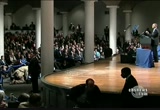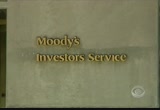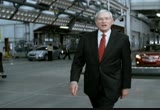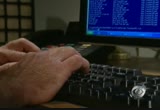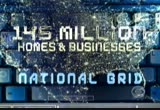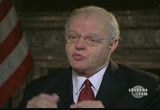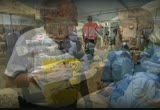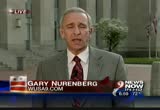tv CBS Evening News With Katie Couric CBS April 22, 2010 6:30pm-7:00pm EDT
6:30 pm
>> tonight, the disaster in the gulf. hopes dim for the missing oil workers as the burning rig sinks into the sea. i'm maggie rodriquez. also tonight, taking it to the street. the president challenges wall street to embrace financial reform. >> and unless your business model depends on bilking people, there's little to fear from these new rules. >> bouncing back-- the housing crisis may be easing with first-time buyers leading the way. plus, with hundreds of millions of attacks on u.s. computers every day, where does america stand on cyber-security? captioning sponsored by cbs from cbs news world headquarters in new york, this is the "cbs evening news" with katie couric.
6:31 pm
the. soant the search continues for the 11 workers missing since the explosion late tuesday night. the coast guard has now expanded its search area to cover 3,000 square miles of the gulf waters. whit johnson has the latest. >> reporter: when the oil rig finally sank into the gulf of mexico this morning, there was still no sign of the missing. now an environmental concern-- the coast guard estimates crude oil at the rate of 8,000 barrels a day, could be spilling into the open sea. 700,000 gallons of diesel fuel was also stored on the rig, and now that it's underwater, officials don't know whether that fuel is also spilling. they do know this accident has a potential to be an environmental disaster. >> i think there are just too many uncertainties for us to be able to estimate what the volume
6:32 pm
of the potential spill could be. >> reporter: b.p. oil, which leases the platform and, and the coast guard have at least 35 containment vessels dispatched to the area. if necessary, they hope to use an underwater robot to stop the flow of oil but don't know when that might be. >> we have the ability to apply-- preapproved ability to apply disbursents. disbursents. >> reporter: officials suspect the deep water horizon may have suffered what is called a blowout. there is a delicate balance of pressure as water is being pumped into the well to push oil up. if too much pressure builds, the oil can suddenly and forcefully gush back up. an emergency valve, known as a blow-out preventer, can seal pipes off, but if it fails or isn't activated, a massive fire could ignite. officials now believe the missing men may have been on the platform and may not have had enough time to escape. loved ones can do little but hope. >> just wait and see, wait until
6:33 pm
we hear something. that's all we can do right now. >> you don't know who is alive and who is not. >> reporter: more than 100 men who made it off the rig alive were reunited with their families today. today. what was the first thing your son said to you? >> "thank god i wasn't up on the rig floor." "thank god i wasn't on the rig floor." >> reporter: the coast guard says it will continue its search for the missing. if necessary, b.p. says it will drill what is called a relief well next to the existing one. they'll power in concrete in an an effort to seal it off. >> rodriquez: to our other top story. president obama came to new york today to sell wall street on what he called updated, commonsense financial regulations. the president said it's the only way to avoid another economic crisis. chief white house correspondent chip reid is at the new york stock exchange. chip, good evening. >> reporter: good evening, maggie. the president came here with two very different messages for wall
6:34 pm
street bankers, first, a stinging rebuke for what he called their reckless practices and second, an invitation to join him in fighting for financial reform. ( cheers ). >> thank you. >> reporter: to an audience that included some of wall street's top bankers, the president argued there's no legitimate reason to oppose financial reform. >> and unless your business model depends on bilking people, there's little to fear from these new rules. >> reporter: he criticized bankers for sending a battalion of lobbyists to congress and poked fun at wall street's instinctive opposition to regulation, reading a quote from "time" magazine. >> through the great banking houses of manhattan last week ran wild-eyed alarm. >> reporter: he then revealed it was from 1933, opposing the f.d.i.c., the government agency that to this day insures bank deposits. but the president said his chief purpose in coming here was not to criticize the financial industry. >> i'm here today because i want to urge you to join us instead
6:35 pm
of fighting us in this effort. >> reporter: on wall street, the big banks say they support most of the reform package and are willing to work with the president. but community banks say the bill will tie them up with more than two dozen new kinds of red tape. >> they would limit the ability of your local bank to make loans to consumers and to small businesses to create jobs. >> reporter: on capitol hill, some angry republicans said the president's plan is not what the american people want. >> they want sensible reforms that will fix the problem. they don't want a government takeover. >> my friends on the other side of the aisle are betting on failure again. >> reporter: in the senate, where just yesterday bipartisanship seemed to be breaking out all over, today saw a return to gridlock and finger pointing. >> here we go again. >> reporter: a crucial senate vote is scheduled for monday. the white house says they are confident they'll get a bipartisan majority. maggie. >> rodriquez: chip reid on wall street. thank you, chip. a senate report out tonight says the agencies that rate
6:36 pm
investments deserve some of the blame for the financial meltdown. according to that report, those agencies helped banks disguise the risks of the investments they marketed, selling high-risk securities with low-risk labeles. more on that now from chief investigative correspondent armen keteyian. >> reporter: fallout from the s.e.c.'s fraud case against goldman sachs is now drifting in the direction of the credit rating agencies that blessed the controversial deal. >> the credit rating agency failed completely. you had a totally, intentionally created toxic asset. >> reporter: on paper, it was known as abacus 2007-ac1, essentially a billion-dollar bet that the people living in these homes and others were headed for foreclosure or default. the s.e.c. alleges goldman helped hedge fund manage john paulson win the bet by loading abacus with low-quality loans includings a high percentage of adjustable rate mortgage mord
6:37 pm
buyers with relatively low fico, or credit scores. yet, when those toxic loans were packaged and presented to investors they smelled more like french perfume. one big reason it's deal received the highest possible credit rating, stamped triple a., by the two top agencies, moody's and standard & poors, meaning it should have been a much safer investment. jack chen is a former moodees's analyst. >> investors, back in 2007, gave a lot of credence and had a lot of faith in the triple a. rating. >> reporter: the problem-- rating agencies are paid by the people who create the product, a conflict of interest akin to movie critics collecting checks from studios to review films. >> the truth is they are working for wall street ask they're going to give wall street what wall street wants. >> reporter: both moodies and standard & poors declined to comment on our story. the new financial reform bill will seek stronger regulation and more transparency, but in the end it appears it will do little to change the way the
6:38 pm
ratings game is played. armen keteyian, cbs news, new york. >> rodriquez: the financial crisis was triggered when the bottom fell out of the housing market. today, though, some good news-- the government reported sales of existing homes jumped nearly 7% from february to march. senior business correspondent anthony mason reports it's a sign the long slump may finally be easing. >> after you. >> thank you. >> reporter: in westchester county, new york, realtor simon driver has seen the change in the housing market. >> we're getting a lot more requests for showings, a lot of activity. it's busy now. it's a good thing. >> reporter: sales of existing homes rose sharply in every region of the country in march, and while the median price of a single-family home is up only slightly over a year ago, boston, phoenix, pittsburgh, san diego, and st. louis, all have seen double-digit price increases. >> i think we've seen the housing market stabilize, and actually now we're looking at the beginnings of a recovery. >> reporter: in march, 44% of
6:39 pm
sales were to first-time home buyers, taking advantage of the stimulus plan's $8,000 tax credit. >> sign above your name and date it. >> reporter: like the are you carams who closed on their house today. >> it feels great. it's a big accomplishment. >> reporter: the tax credit expires at the end of this month, but economists expect the housing market will strengthen as the job market improves. there's also encouraging news on the foreclosure front. mortgage delinquencies finally are declining. the number of borrowers behind in their payments fell more than 8% in march, the second straight monthly drop. >> i see improvement. i see good things ahead. >> reporter: at last, recession-battered realtors are daring to be optimistic again. anthony mason, cbs news, new york. >> rodriquez: coming up next on the cbs evening news, the u.s. is under attack by an army of computer hackers. so where does america stand on cyber-security?
6:42 pm
>> rodriquez: it's scary when you think about it-- how much we depend on computers and the internet, especially considering the system's never been more vulnerable. in a recent survey, three quarters of business and organizations claim they experienced a cyber-attack last year reported that hackers have been able to steal
6:43 pm
critical information from google, so what's being done to stop this? terry mccarthy continues our series "cbs reports: where america stands." >> reporter: cyber-space-- it enables, e-mail, electricity grids, international banking and military superiority. we can't live without it. but increasingly, experts say the openness of cyber-space is putting the u.s. in jeopardy. >> we can say that sovereignty is at risk. >> reporter: sami saydjari heads the cyber-defense agency, an information security company. >> basically, our whole superpower status in the united states depends on computers. we lose them, we lose our status as a superpower and become a third world country overnight. >> reporter: the u.s. is vulnerable because there's no accountability, limited security, and no international rule of law in cyber-space. regularly, state-sponsored hackers in russia and china are attacking government networks.
6:44 pm
the pentagon gets 360 million unauthorized probes every day. in tbow 7, the cyber-systems of central command, the state department, the department of commerce, and nasa were successfully hacked. they lost millions of pages of classified information. they're not alone. under constant attack, corporate america is losing critical data to overseas competitors, robbing the u.s. economy of up to $20 billion a year. two years ago hackers stole top-secret exploration data from oil and gas industry giants exxon mobil, conico phillips and marathon oil, using custom-made software to bypass antivirus programs. >> it's so widespread now we face the prospect of entire industries being stolen. >> reporter: while the details of theirs locations cannot be revealed for security reasons, cbs news has learned there are factories in china and southeast asia that are exact replicas of plant in the united states, built with everything from hacked blueprints and supplier
6:45 pm
lists down to the settings used to regulate valve pressures for individual machines they're stealing entire factories. >> they're stealing all of the information on how to create and run and lay out a factory, not just at a basic level but at maximum efficiency. >> reporter: most worrisome is the risk to the u.s. power grid, a six million-mile web of electrical distribution lines powering up nearly 145 million homes and businesses, all controlled by computer commands and open to cyber-attackers. this american hacker, known as "mudge" knows firsthand how vulnerable these systems are. 10 years ago he bored into regional utility networks. within a week he worked out how to take most of them down. it was terrifying. it was absolutely terrifying. that was my epiphany was if i figured it out, other people figured it out, also. >> reporter: known as a "gray hacker" someone who haks without
6:46 pm
inflicting cyber-harm, mudge gave that information to those companies to fortify their systems. the result-- >> they've become more complex. they've become more intricate in their interactions. >> reporter: are they more secure? >> no. they're really not. >> reporter: trying to solve this problem are companies like verizon, who have set up five cyber-crisis centers around the world. they guard against potential hacks on 700,000 miles of fiber optics, which links systems in 159 countries. >> we mainly use our operation centers to figure out what's going on months ahead of time or weeks ahead of time to figure out the trends that are going on. >> reporter: the most serious attacks show up as red dots, alerting response teams while a hack is going on. about 70% of all global internet traffic at some stage passes through a verizon router, and here in their security center in virginia, they monitor about one billion security events every
6:47 pm
day-- however, about three-quarters of all cyber-attacks come from outside the united states where the u.s. government has no jurisdiction. >> we're not as prepared as we should be. >> reporter: a reality the white house is trying to change. >> we're looking across the spectrum what are the legal frameworks, not only domestically, but internationally. >> reporter: howard schmidt is the nuclear appointed white house cyber-czar. his job is to make america's networks safe against attacks wherever they come from. >> but the key issue that we understand and we're working towards is reducing the vulnerabilities. >> reporter: the government is also quietly hiring hackers to learn their secrets. last month, mudge began working for darpa, the secretive research arm of the department of defense. however, the u.s. is playing catch-up. countries like china and russia have dedicated considerable resources to the cyber-battlefront, while the u.s. has been slow to react. >> so, establish it's a problem, declare it as a national priority, develop a plan, and then invest properly in this. >> reporter: the u.s. invented the internet.
6:48 pm
now it needs to find ways to make it safe. terry mccarthy, cbs news, ashburn, virginia. >> rodriquez: and you can go to the internet to find all the story in this series. cbsnews,.com. and please tell us where you stand on the issues we're covering. we'll have more news next, and later, an angst anti-occupation, but does it have a future in the 21st century?
6:51 pm
glog today, earth day furniture 40, and a new cbs news poll shows americans have big concerns about the future of our planet. nearly half expect the environment to be in worst shape for the next generation. only 16% think it will improve, while a third say it will stay the same. 190 countries held earth day events today. in florida a 200-pound turtle named pal was returned to the sea. over 5,000 parisians created this human tree. and in geruse lem, a light show on the walls of the old city. the power of mother nature brought air travel in europe to a standstill but more than a week after that vol volcano in iceland created a cloud of ash, things are getting back to normal. today up to 29,000 flights were expected in and out of europe, which is the usual number.
6:52 pm
however, it could still take days to clear the backlog of stranded passengers. meantime, a missouri man can fly wherever he wants. chris shaw is the sole winner of last night's powerball jackpot worth neil $260 million for one guy. he bought five tickets at a convenience store yesterday after work. did i mentioned 29-year-old works there as a clerk. his boss is very happy about this because he gets a bonus-- $50,000 for selling him the winning ticket. up next, billions of coconuts. but soon there may be no one left to pick them.
quote
6:55 pm
6:56 pm
there's something that's getting harder and harder to find-- not a rare species, but an endangered specialty. plucking coconuts. armed with just a sharp knife and a bamboo ladder, generations have shimmied up to harvest by hand the 15 billion coconuts india produces every year. pk has picked coconuts for 22 years. "it's a very difficult job," he says, "but i do not have the option to do anything else." he followed his father into this line of work, but, "after me," he says, "i don't think anyone else in my family will do this." he earns about 20 cents per tree. on a good day, almost $8. that's decent money for a dangerous climb.
6:57 pm
coconut picker like you? "no," he says. "i want to send them to college." his son, vic newark would rather be an engineer, his daughter, braveela, a teacher. "none of my friends want to be coconut pickers" she says. "we all want to have bigger jobs." this is a story about coconuts but it's also a story about the progress of india itself. kerala has close to a 100% literacy rate and as new, higher paying job opportunities abound, fill those traditional jobs is much harder. at the coconut development board, they're worried. how concerned are you about the short annual of pluckers? >> we have much concern. >> reporter: thomas matthew has watched kerala's coconut harvest drop 12% since 2006, and government attempts to mechanize the process have certainly come up short. why is it so difficult to find the next generation of coconut pickers? >> basically, when they get
6:58 pm
education,un, they're naturally going for white-collar jobs. >> reporter: only about half the coconuts harvested here are eaten. fibers from the are exported to the u.s. while oil is extracted for cook exg making soap and shampoo, and they're even part of worship here, broken open as an offering to god. you say it's a dpd job, but you don't want your kids to do it. why? "for the next generation," he explains," "there are other opportunities." and that leaves the future of these traditional jobs up in the air. seth doane, cbs news, kerala, india. >> rodriguez: and that is the cbs evening news for tonight. i'm maggie rodriquez. katie will be back tomorrow night, and i'll see you tomorrow in the morning on "the early show." good night. captioning spo
6:59 pm
charges dropped. that 14-year-old who was facing 41 charges connected to last month's deadly shooting spree in southeast didn't have anything to do with it afterall. live in dc police headquarters with the latest. a few hours ago, a press conference. >> reporter: derek, a stunning change in what they have described as one of the most violent crimes in dc history. four killed and five wounded in that drive-by shooting on march 30. the 14-year-old was apprehended that night. as you said, charges with 41 pounds, including the getaway driver. leaving all of washington to ask how someone so young could be involved in a crime that horrific. the answer came a few minutes ago. he wasn't, he had nothing to do with it. the police chief blames the chaos of the wild police chase that followe
380 Views
IN COLLECTIONS
WUSA (CBS) Television Archive
Television Archive  Television Archive News Search Service
Television Archive News Search Service 
Uploaded by TV Archive on

 Live Music Archive
Live Music Archive Librivox Free Audio
Librivox Free Audio Metropolitan Museum
Metropolitan Museum Cleveland Museum of Art
Cleveland Museum of Art Internet Arcade
Internet Arcade Console Living Room
Console Living Room Books to Borrow
Books to Borrow Open Library
Open Library TV News
TV News Understanding 9/11
Understanding 9/11



